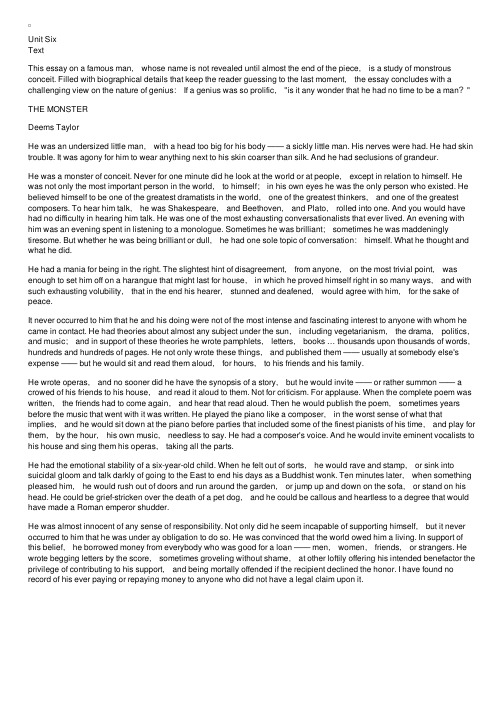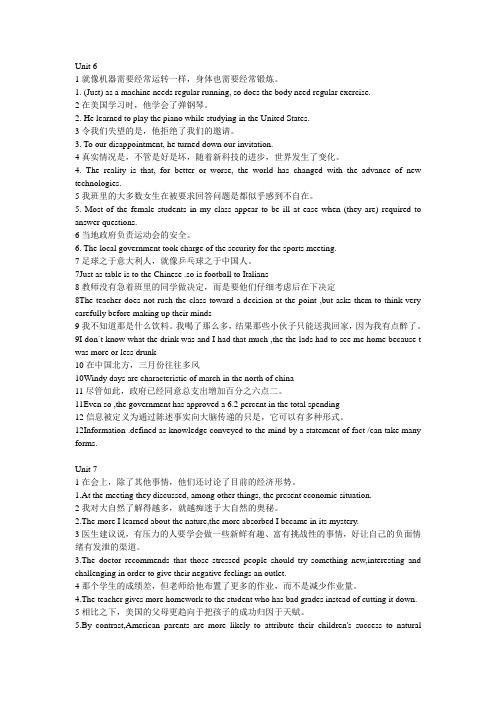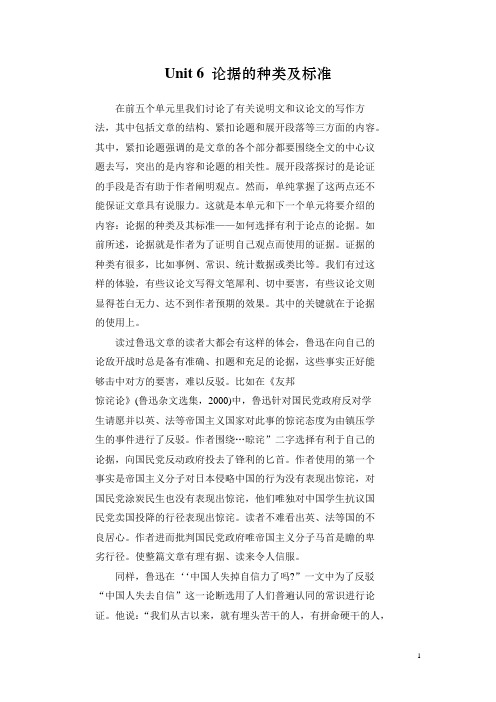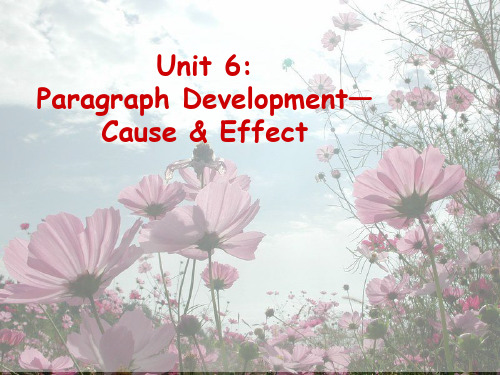大学英语高级写作教程Unit 6
大学英语写作精选第六册(6)

Unit SixTextThis essay on a famous man, whose name is not revealed until almost the end of the piece, is a study of monstrous conceit. Filled with biographical details that keep the reader guessing to the last moment, the essay concludes with a challenging view on the nature of genius: If a genius was so prolific, "is it any wonder that he had no time to be a man?"THE MONSTERDeems TaylorHe was an undersized little man, with a head too big for his body —— a sickly little man. His nerves were had. He had skin trouble. It was agony for him to wear anything next to his skin coarser than silk. And he had seclusions of grandeur.He was a monster of conceit. Never for one minute did he look at the world or at people, except in relation to himself. He was not only the most important person in the world, to himself; in his own eyes he was the only person who existed. He believed himself to be one of the greatest dramatists in the world, one of the greatest thinkers, and one of the greatest composers. To hear him talk, he was Shakespeare, and Beethoven, and Plato, rolled into one. And you would have had no difficulty in hearing him talk. He was one of the most exhausting conversationalists that ever lived. An evening with him was an evening spent in listening to a monologue. Sometimes he was brilliant; sometimes he was maddeningly tiresome. But whether he was being brilliant or dull, he had one sole topic of conversation: himself. What he thought and what he did.He had a mania for being in the right. The slightest hint of disagreement, from anyone, on the most trivial point, was enough to set him off on a harangue that might last for house, in which he proved himself right in so many ways, and with such exhausting volubility, that in the end his hearer, stunned and deafened, would agree with him, for the sake of peace.It never occurred to him that he and his doing were not of the most intense and fascinating interest to anyone with whom he came in contact. He had theories about almost any subject under the sun, including vegetarianism, the drama, politics,and music; and in support of these theories he wrote pamphlets, letters, books … thousands upon thousands of words,hundreds and hundreds of pages. He not only wrote these things, and published them —— usually at somebody else's expense —— but he would sit and read them aloud, for hours, to his friends and his family.He wrote operas, and no sooner did he have the synopsis of a story, but he would invite —— or rather summon —— a crowed of his friends to his house, and read it aloud to them. Not for criticism. For applause. When the complete poem was written, the friends had to come again, and hear that read aloud. Then he would publish the poem, sometimes years before the music that went with it was written. He played the piano like a composer, in the worst sense of what that implies, and he would sit down at the piano before parties that included some of the finest pianists of his time, and play for them, by the hour, his own music, needless to say. He had a composer's voice. And he would invite eminent vocalists to his house and sing them his operas, taking all the parts.He had the emotional stability of a six-year-old child. When he felt out of sorts, he would rave and stamp, or sink into suicidal gloom and talk darkly of going to the East to end his days as a Buddhist wonk. Ten minutes later, when something pleased him, he would rush out of doors and run around the garden, or jump up and down on the sofa, or stand on his head. He could be grief-stricken over the death of a pet dog, and he could be callous and heartless to a degree that would have made a Roman emperor shudder.He was almost innocent of any sense of responsibility. Not only did he seem incapable of supporting himself, but it never occurred to him that he was under ay obligation to do so. He was convinced that the world owed him a living. In support of this belief, he borrowed money from everybody who was good for a loan —— men, women, friends, or strangers. He wrote begging letters by the score, sometimes groveling without shame, at other loftily offering his intended benefactor the privilege of contributing to his support, and being mortally offended if the recipient declined the honor. I have found no record of his ever paying or repaying money to anyone who did not have a legal claim upon it.。
新视野大学英语2读写教程unit6-unit9课后翻译原题及答案

1就像机器需要经常运转一样,身体也需要经常锻炼。
1. (Just) as a machine needs regular running, so does the body need regular exercise.2在美国学习时,他学会了弹钢琴。
2. He learned to play the piano while studying in the United States.3令我们失望的是,他拒绝了我们的邀请。
3. To our disappointment, he turned down our invitation.4真实情况是,不管是好是坏,随着新科技的进步,世界发生了变化。
4. The reality is that, for better or worse, the world has changed with the advance of new technologies.5我班里的大多数女生在被要求回答问题是都似乎感到不自在。
5. Most of the female students in my class appear to be ill at ease when (they are) required to answer questions.6当地政府负责运动会的安全。
6. The local government took charge of the security for the sports meeting.7足球之于意大利人,就像乒乓球之于中国人。
7Just as table is to the Chinese .so is football to Italians8教师没有急着班里的同学做决定,而是要他们仔细考虑后在下决定8The teacher does not rush the class toward a decision at the point ,but asks them to think very carefully before making up their minds9我不知道那是什么饮料。
大学英语写作Unit 6

人们读了以后很快就把它们忘掉。其原因正是这些卡通在故事情
节、人物塑造、写作手法和内容来源上都有着千人一面的模式,
因此生命力如昙花一现、十分短暂。联系本文标题和作者的论点
我们发现,这一论据的使用不够准确。因为作者没有将一部作品
的生命力与它是否属于艺术联系起来,而本文的中心议题正是评
价日本漫画是否属于艺术。正确的做法是先对什么是“艺术”加
其中,紧扣论题强调的是文章的各个部分都要围绕全文的中心议
题去写,突出的是内容和论题的相关性。展开段落探讨的是论证
的手段是否有助于作者阐明观点。然而,单纯掌握了这两点还不
能保证文章具有说服力。这就是本单元和下一个单元将要介绍的
内容:论据的种类及其标准——如何选择有利于论点的论据。如
前所述,论据就是作者为了证明自己观点而使用的证据。证据的
惊诧论》(鲁迅杂文选集,2000)中,鲁迅针对国民党政府反对学
生请愿并以英、法等帝国主义国家对此事的惊诧态度为由镇压学
生的事件进行了反驳。作者围绕…晾诧”二字选择有利于自己的
论据,向国民党反动政府投去了锋利的匕首。作者使用的第一个
事实是帝国主义分子对日本侵略中国的行为没有表现出惊诧,对
国民党涂炭民生也没有表现出惊诧,他们唯独对中国学生抗议国
4We might look over those disadvantages of cartoon, for it’s too young to blame. The Japanese cartoon appeared in the1970’s, then flourished in the1980’s and1990’s, and now is celebrating its 30thbirthday. Technically,it’s developed so much[it’s been developed very quickly]. Those simple-colored, stiff-animated images of the70’swere replaced[have been replaced] by dazzling animation. Nevertheless, what affects me mostwere[are] still the masterpieces of the early age. In “SkyCity,” it showed the inevitable fall of a once powerful civilization. In “Touch,” the slightest emotion was delicatelydemonstrated. Judged by [the] modernstandard, these two were “poorlydrew[drawn],” but they really told something. They made sense. Whenthe emptiness of so-called moderncartoon made me sick, I wouldturnto old ones for relief. Cartoonare[is] so strangely bred that it is now technically mature but mentally childish. The imbalance caused by its short history and commercializing trend should not be overlooked.
高职国际英语进阶综合教程unit6作文

高职国际英语进阶综合教程unit6作文In the rapidly evolving landscape of higher education, the importance of international English proficiency has become increasingly paramount. As students aspire to broaden their horizons and engage with a global community, the need for a comprehensive and progressive English language curriculum has never been more pressing. The High Vocational International English Advanced Comprehensive Course, specifically Unit 6, serves as a vital tool in equipping learners with the necessary skills and knowledge to thrive in this interconnected world.Unit 6 of this course delves deep into the multifaceted realm of international communication, providing students with a holistic understanding of the nuances and best practices that underpin effective cross-cultural exchanges. Through a carefully curated selection of topics and activities, this unit empowers learners to navigate the complex web of cultural differences, linguistic variations, and interpersonal dynamics that often characterize global interactions.One of the core emphases of Unit 6 is the development of intercultural competence a critical skill that enables individuals to engage with people from diverse backgrounds with sensitivity, empathy, and adaptability. The course material explores the fundamental principles of cultural awareness, highlighting the importance of recognizing and respecting the unique perspectives, values, and norms that shape individual and societal behaviors. By fostering a deep appreciation for cultural diversity, students are better equipped to overcome communication barriers, build trust, and forge meaningful connections with their international counterparts.In addition to cultivating intercultural competence, Unit 6 also places a strong emphasis on the refinement of practical language skills. Through a comprehensive array of listening, speaking, reading, and writing exercises, learners are challenged to hone their English proficiency in real-world scenarios. From conducting effective negotiations and delivering impactful presentations to engaging in thought-provoking discussions and crafting persuasive written communications, the course equips students with the linguistic agility necessary to thrive in a globalized professional landscape.Notably, the unit also delves into the nuances of international business etiquette, providing students with invaluable insights into the cultural norms and expectations that govern professionalinteractions across borders. By understanding the subtle yet crucial differences in communication styles, decision-making processes, and relationship-building practices, learners are better prepared to navigate the complexities of the international business environment with confidence and cultural sensitivity.Furthermore, Unit 6 encourages students to explore the role of technology in facilitating global collaboration and communication. From the use of online platforms and virtual conferencing tools to the effective management of remote teams and cross-border projects, the course empowers learners to leverage technological advancements in service of their international endeavors. By developing a keen understanding of digital communication best practices, students are poised to excel in the increasingly digitalized and interconnected world of work.Perhaps most importantly, Unit 6 fosters a deep sense of global citizenship among its participants. By cultivating a profound appreciation for the interconnectedness of the world and the shared challenges faced by diverse communities, the course inspires students to adopt a more holistic and empathetic worldview. This mindset not only enhances their ability to collaborate effectively with international partners but also encourages them to become active contributors to the global community, leveraging their language skills and cultural insights to drive positive change.In conclusion, the High Vocational International English Advanced Comprehensive Course, specifically Unit 6, stands as a transformative educational experience that equips students with the essential skills and mindset required to thrive in the interconnected global landscape. By nurturing intercultural competence, refining practical language proficiency, and fostering a deep sense of global citizenship, this unit empowers learners to bridge cultural divides, forge meaningful connections, and contribute to the betterment of the world around them. As the demands of the 21st century continue to evolve, the importance of this comprehensive and progressive English language curriculum cannot be overstated.。
实用阶梯英语写作教程课件unit 6 Cause and Effect

Logical Orders for causes & effects
There are basically two ways of organizing paragraphs developed by cause and effect. The first method is to state an effect and devote the rest of the paragraph to examining the causes, which is called effect-to-cause pattern. The second method is to state a cause and then mention or predict the effects which is called cause-to-effect pattern. Please look at the reference reading on P47 and analyze their patterns.
Warm-up Activity: Living on/off campus
Do you want to live on or off campus? And why? Read the passage to get the author’s opinion. Whether his/her choice is the same as yours or not. • 1. Read the passage and summarize the advantages and their supporting reasons. • 2. Write down your own opinions and reasons. • 3. Give a mini-speech within 3 minutes to convince your classmates.
新视野大学英语1读写教程unit6教案

教学目标:1. 培养学生对就业与工作问题的理解,提高批判性思维能力。
2. 巩固和扩展学生对于词汇、语法以及语篇结构的认识。
3. 提升学生的阅读理解能力和写作技巧,特别是针对议论文的写作。
4. 增强学生的跨文化交流意识,理解不同文化背景下对于工作与生活的看法。
教学重点:1. 理解文章主旨和论点。
2. 掌握与就业、工作相关的词汇和表达。
3. 学习议论文的写作结构和技巧。
教学难点:1. 理解文章中复杂的逻辑关系和论据。
2. 准确运用语法知识进行写作。
教学内容:一、课文内容概述本单元课文围绕“是否应该工作”这一主题展开,探讨了工作对学生成就、个人成长以及社会稳定的影响。
文章首先介绍了衡量工作对学生成就影响的方法,接着对比了打工学生和不打工学生在学习投入程度方面的差异,最后讨论了不同工作模式对学校表现和参与度的影响。
二、教学步骤1. 导入(5分钟)- 提问:同学们,你们认为工作对学生有什么影响?请分享你们的观点。
- 引导学生思考工作与学习、个人成长之间的关系。
2. 课文阅读(15分钟)- 阅读课文,了解文章主旨和论点。
- 针对文章中的生词和难句进行讲解。
3. 讨论与分析(15分钟)- 分组讨论:根据文章内容,分析工作对学生成就的影响。
- 学生分享讨论成果,教师点评并总结。
4. 词汇学习(10分钟)- 学习与就业、工作相关的词汇和表达,如:employment, achievement, commitment, stability等。
- 通过例句和练习,巩固词汇。
5. 语法讲解(10分钟)- 讲解与议论文写作相关的语法知识,如:复合句、并列句等。
- 通过例句和练习,巩固语法知识。
6. 写作指导(10分钟)- 分析议论文的写作结构和技巧。
- 学生根据所学内容,撰写一篇关于“是否应该工作”的短文。
7. 课堂小结(5分钟)- 总结本节课的重点内容,强调议论文写作的注意事项。
三、课后作业1. 阅读相关材料,了解不同文化背景下对于工作与生活的看法。
写作教程第二版(邹申)-Unit 6

Certain principles
1. Avoid circular definitions Democracy is the democratic process. An astronomer is one who studies astronomy. 2. Avoid long lists if synonyms By imagination, I mean the power to form mental images of object; the power to form new ideas; the gift of employing images in writing;…. 3. Avoid loaded definitions By state enterprise I mean high cost and poor efficiency.
What is it? What are its limits or boundaries?
Made by Pizza. C
Questions
Pride
What’s the According to Webster Dictionary “pride” is defined as definition of “pride” “arrogance, loftiness, conceit, self-respect, dignity, and in a dictionary? valuing oneself.”
3. The distinguishing characteristics of them
Made by Pizza. C
Features of Definition
There are 3 basic ways to define a word or a term: 1. give a synonym 2. to use a sentence (often with a attributive sentence) 3. to write a paragraph or even an essay.
乐学英语写作教程教学课件unit6

Task 2: 申请人在留学申请信中描述自己时,采用故事的形式是个不错的 选择。根据下面的开头提示,用英文简单地描述某个事件及其对你的深 远影响。
When I first entered high school, I was shy and had low self-confidence. I avoided asking any questions in class because I didn’t want to be laughed at in case my questions were stupid. At that time, I was crazy about football. I practiced my skills almost every evening in the playground. Fortunately, I was selected for the school football team and played as center forward in many formal and informal games. At the very beginning, I was afraid to catch the ball, and was fearful of making mistakes, which I did quite often in many games, causing my coach and teammates to yell at me. But when I played a great game, they congratulated me heartily. Gradually, I was no longer worried about making mistakes. Instead, I wanted to share more responsibilities in the team. Playing football taught me a lot. It made me a team player as well as a confident man.
- 1、下载文档前请自行甄别文档内容的完整性,平台不提供额外的编辑、内容补充、找答案等附加服务。
- 2、"仅部分预览"的文档,不可在线预览部分如存在完整性等问题,可反馈申请退款(可完整预览的文档不适用该条件!)。
- 3、如文档侵犯您的权益,请联系客服反馈,我们会尽快为您处理(人工客服工作时间:9:00-18:30)。
I. Lead-in Activities II. Guidance for Creative Writing III. Practice IV. Sample Creative Essays V. Assignment
I. Lead-in Activities
Activity 1: Choose one of the following questions, and talk about it with your partners. – Your boyfriend/girlfriend, who is very jealous, volunteers for a clone experiment. It succeeds, and now there are two of them, exactly the same. What happens? – As you are going to visit your dentist in a tall office building, the crowded elevator gets jammed between the floors. Several doctors' patients with serious problems are also there. The elevator may not be fixed quickly. What happens? – Three men wearing strange hats follow you and your girlfriend/boyfriend during a school trip. It turns out that your friend is an alien with amnesia, and can't remember a thing. What happens?
Unit 6 Creative Writing
Learning Objectives
Students who have engaged successfully with the learning activities proposed here are supposed to be able to: – Write creatively in the opening, developing and concluding part of an essay. – Show evidence of an ability to see the creativity in one’s own and other peoples’ ideas. – Master some writing techniques that can facilitate the development of a creative perspective. – Think creatively when composing an essay. – Find ways to be different from previous writing.
II. Guidance for Creative Writing
1. Definition of creative writing Creative writing is a term used to distinguish certain imaginative or different types of writing from technical writing. The lack of specificity of the term is partly intentional, designed to make the process of writing accessible to people of all ages and to ensure that ห้องสมุดไป่ตู้on-traditional, or traditionally lowstatus writing (i.e. writing by marginalized social groups, experimental writing, genre fiction) is not excluded from academic consideration or dismissed as trivial or insignificant. Creative writing includes but is not limited to:
Activity 2: Video Clip Watching. The Bear’s three picnics Unit 6\Unit 6 Creative Writing Three picnics of the bear.wmv Video Follow-up: 1) Teacher shows students the bear’s picnics for the first two days, and then students are required to discuss in pairs, for 3 minutes, about what will happen at the bear’s picnic on day three. T invites Ss to report what they have discussed and then shows them what really happened at the bear’s third day picnic. 2) Teacher shows students the bear’s contact with the aliens. 3) Write down the key words or main idea of the two video clips (Possible answer: unlucky, funny)
